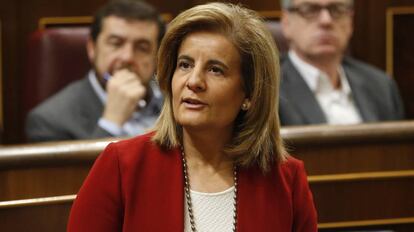Spain to spend €450 million on youth wage subsidies
But budget restrictions will see assistance limited to a pilot program for workers under 30
The Spanish government will earmark €450 million to help low-earning young people in the country. The decision is the result of negotiations between the ruling Popular Party (PP) and the reform-oriented party Ciudadanos, which voted for Mariano Rajoy’s reinstatement in exchange for a series of measures aimed at streamlining government, curtailing corruption and improving the economy.

But the Popular Party (PP) administration’s offer falls significantly short of the €1.3 billion that Ciudadanos had originally demanded for the so-called “salary complement,” a subsidy for the country's lowest earners.
If the pilot program is successful, it could be expanded in coming years
Due to budget restrictions – including renewed calls by Brussels to reduce the deficit in 2017 – the Labor Ministry will lower the amount to €450 million, spend it exclusively on a pilot program for under-30s, and try to finance the program with European funds.
The “salary complement” was Ciudadanos’ version of the basic universal income defended by the leftist Podemos. But recipients won't be sent a check: it is to be delivered through income tax relief instead.
However, Spain’s soaring public deficit forced the measure’s sponsors to gradually reduce the original amount and restrict eligibility to specific at-risk groups, such as unskilled youths or the long-term unemployed.
Ciudadanos is still asking for something closer to €1 billion, but sources at the Labor Ministry confirmed that in 2017, the initial amount will be €450 million.
Other measures
The PP and Ciudadanos have also negotiated a €235 million appropriation in the 2017 budget to raise the paternity leave from two to four weeks, said sources at Ciudadanos, which is also working on expanding the maternity leave.
If the pilot program is successful, it could be expanded in the coming years to include a wider range of beneficiaries, these sources said.
Although still at a very preliminary phase, the system envisions a baseline subsidy that increases as the recipient’s income grows, as a way to encourage people to work more. After a certain income threshold has been reached, the subsidy begins to shrink.
English version by Susana Urra.
Tu suscripción se está usando en otro dispositivo
¿Quieres añadir otro usuario a tu suscripción?
Si continúas leyendo en este dispositivo, no se podrá leer en el otro.
FlechaTu suscripción se está usando en otro dispositivo y solo puedes acceder a EL PAÍS desde un dispositivo a la vez.
Si quieres compartir tu cuenta, cambia tu suscripción a la modalidad Premium, así podrás añadir otro usuario. Cada uno accederá con su propia cuenta de email, lo que os permitirá personalizar vuestra experiencia en EL PAÍS.
¿Tienes una suscripción de empresa? Accede aquí para contratar más cuentas.
En el caso de no saber quién está usando tu cuenta, te recomendamos cambiar tu contraseña aquí.
Si decides continuar compartiendo tu cuenta, este mensaje se mostrará en tu dispositivo y en el de la otra persona que está usando tu cuenta de forma indefinida, afectando a tu experiencia de lectura. Puedes consultar aquí los términos y condiciones de la suscripción digital.








































